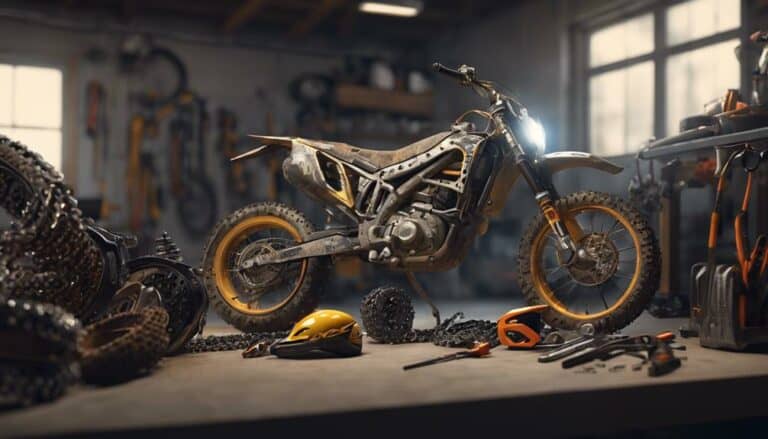When facing mechanical failures while dirt biking, it's not like you can just magically fix everything with a wave of a wand. Safety precautions are key, starting with proper gear and regular bike maintenance.
But what about when things go awry mid-ride? Stay tuned to uncover essential tools and steps to handle on-trail repairs like a pro. Your safety and bike's well-being depend on it.
Key Takeaways
- Conduct pre-ride inspections to catch issues early.
- Equip with essential tools and spare parts for quick fixes.
- Address unusual noises or handling promptly for safety.
- Recognize warning signs and seek professional help for complex problems.
Importance of Regular Dirt Bike Maintenance
Regular upkeep of your dirt bike is essential for preventing mechanical failures during your rides. Regular maintenance checks on brakes, tires, and suspension are crucial aspects of ensuring your bike is in the best condition.
By inspecting and maintaining these key components, you greatly decrease the likelihood of experiencing mechanical issues while out on the trails.
When it comes to safety, ensuring that controls such as the throttle, clutch, and brakes are all in good working order is paramount. A failure in any of these areas could result in accidents and injuries.
Additionally, performing pre-ride inspections allows you to identify any potential mechanical failures before they escalate into safety hazards.
Essential Tools for On-Trail Repairs
When venturing on dirt bike trails, having essential tools for on-trail repairs is crucial to handle potential mechanical failures efficiently. To make sure you're prepared for any on-trail repairs, make sure you have the following items:
- Tire Repair Kit: A tire repair kit can help you quickly fix punctures or small tears in the tire, allowing you to continue your ride without delay.
- Multi-tool: A multi-tool with wrenches, pliers, and screwdrivers is essential for making adjustments and minor repairs on the go.
- Spare Parts: Carrying spare parts like brake pads, cables, and spark plugs can be a lifesaver when facing unexpected mechanical issues.
- Emergency Items: Items like zip ties, duct tape, and a flashlight can provide quick fixes in emergency situations, making sure you can address mechanical failures promptly.
Steps to Assess and Address Mechanical Failures
To effectively evaluate and rectify mechanical failures on your dirt bike, begin by conducting thorough pre-ride inspections of critical components. Check the brakes for any signs of wear, such as low brake pad thickness or spongy brake feel. Inspect the tires for proper inflation, tread wear, and any punctures that could lead to a flat tire. Examine the suspension system for leaks, damage, or loose bolts that could affect your ride. Familiarize yourself with the normal sounds and sensations of your bike, so you can quickly identify any abnormalities while riding.
If you notice any unusual noises, vibrations, or handling issues, address them promptly to prevent further damage or accidents. Carry essential tools and spare parts for quick fixes in case of minor mechanical failures on the trail. In the event of a major mechanical failure, safely pull over, assess the situation, and consider seeking professional assistance to avoid risks and potential injuries. Remember, proactive maintenance and swift action can keep you safe and your dirt bike performing at its best.
Precautions for Safe Trailside Repairs
For successful trailside repairs, equip yourself with a complete tool kit containing essential items like wrenches, a tire repair kit, and spare parts to address common mechanical failures effectively. Here are four critical items to make sure you're prepared for safe trailside repairs:
- Basic Tool Kit: A well-equipped tool kit containing wrenches and spare parts is essential for addressing mechanical issues promptly.
- Troubleshoot Knowledge: Familiarize yourself with your bike's components to troubleshoot issues like chain problems or loose bolts on the trail.
- Maintenance Tasks: Practice basic maintenance tasks such as adjusting chain tension and checking fluid levels to prevent mechanical failures.
- Essential Supplies: Carry a portable air compressor for tire issues, zip ties for temporary fixes, and a flashlight for visibility during repairs.
Knowing When to Seek Professional Help
Recognize the caution signs indicating the need for professional assistance in handling mechanical failures to guarantee top safety and performance of your dirt bike.
If you experience unusual sounds, a sudden loss of power, or handling issues, these could be early indicators of a mechanical failure.
Additionally, be vigilant for signs like leaking fluids, brake problems, or unusual vibrations, as they could signify more serious issues requiring expert attention.
Ignoring these warning signs might lead to accidents or further damage to your bike. Seeking professional help promptly is critical when faced with complex mechanical problems beyond your expertise.
Professional mechanics possess the skills and tools to diagnose and repair these issues safely. Timely intervention by experts can prevent major breakdowns and assure a safe riding experience.
Conclusion
To sum up, when handling mechanical failures while dirt biking, remember to prioritize safety by wearing proper gear and conducting regular maintenance checks.
Always be prepared with essential tools for on-trail repairs and know when to seek professional help if needed.
By following these safety precautions and being proactive in addressing mechanical issues, you can enjoy a smoother and safer dirt biking experience. Remember, an ounce of prevention is worth a pound of cure.

